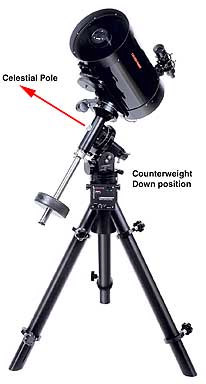
In the southern hemisphere, or in the north if you cannot sight Polaris because of trees or
buildings, you can use Gemini's Polar Align Assist function for an improved polar
alignment after achieving rough alignment using a compass.
Finally, if your mount has a polar alignment scope, follow the instructions that came with
it for polar aligning. In general, this will be more accurate that either of the above
methods.
After you have completed the remaining steps to get you up and running, you can use
Gemini' s Polar Axis Correction feature to achieve a very accurate alignment.
2.4.1.2 Startup Position
Your next step after positioning the mount is to position
the telescope. When Gemini starts up for the first time or
any time after the mount has been moved, it expects the
telescope to be in a standard Startup position. In this
position the counterweight shaft is pointing down, and
the Dec. axis is at 90
(OTA pointing at the celestial
pole). Powering on in this position is necessary so that
(1) Gemini will correctly set its movement safety limits,
and (2) so that it can initialize to where it is pointing.
Failure to power up Gemini with the scope in Startup
position will prevent Gemini from being able to use its
GoTo capability to find a first alignment star; it could
also cause the telescope to collide with the tripod or
mount.
2.4.2 Power On and Setup
Now it is finally time to power up the Gemini. After
turning on the power switch, you will see a welcome
message scroll across the display (pressing the MENU
button terminates the message). When powering up the
unit for the first time, or after inserting/changing the
CR2032 Li battery, you may see the words "CMOS reset" appended to the welcome
message. This means that during startup, an incorrect checksum was detected and the
static memory (SRAM) was reset to its initial values. You should not see this "CMOS
reset" again, unless your battery goes low.
Next, Gemini tries to read time and location data from a GPS attached to the serial port.
If you have a GPS that supports the NMEA0183 protocol or the Garmin Textout
Protocol, you can connect it to Gemini' s serial port. Gemini looks for a GPS every time
it starts up. After attempting to read the GPS data, Gemini briefly displays a GPS status
message. If a GPS is not connected, you will have to set the UTC Date/Time and
geographic coordinates manually.
Gemini Users Manual
1
3
footer
Our partners:
PHP: Hypertext Preprocessor Cheap Web Hosting
JSP Web Hosting
Ontario Web Hosting
Jsp Web Hosting
Cheapest Web Hosting
Java Hosting
Cheapest Hosting
Visionwebhosting.net Business web hosting division of Vision Web Hosting Inc.. All rights reserved

